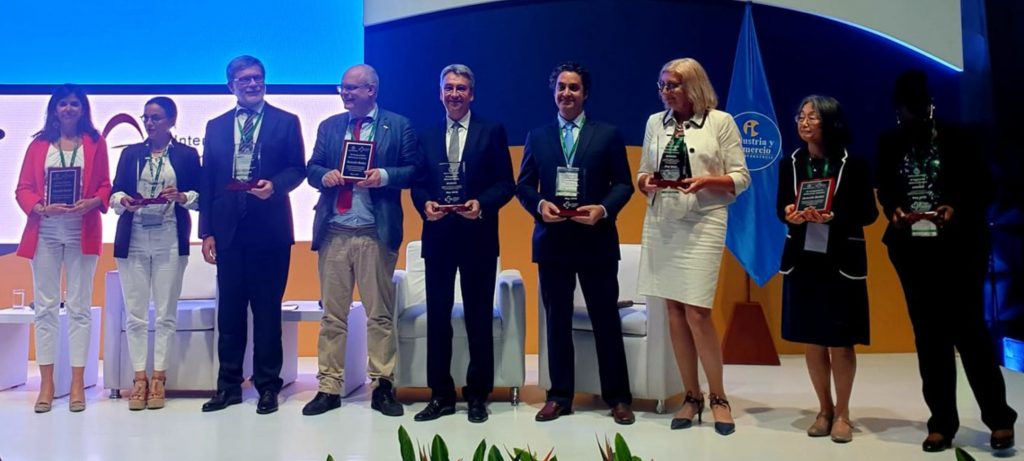
SSNIPpets (28): Far-away countries and people
Commissioner Vestager gives us a break after the European elections. She is antichambering her own affairs, so antitrust enforcement has been postponed for a few days. This gives Rupprecht Podszun the opportunity to look through the pile of paper on his virtual desk, which has grown far too high. Here are his SSNIPpets – small but significant news, information and pleasantries – our pet project!
Market dominance
Two observations on the European elections, since this was a competition : Several parties competing on the market for political ideas for the scarce resource of votes. My first observation relates to the market analysis provided by the media. In Germany, the main topic in the reporting was the new dominant position of the Greens in Germany. They had 20,5 %, a huge plus compared to last time, and they actually came in second for the first time, gaining more votes than the Social Democrats. Actually, 20.5 % is not sufficient for the presumption of market dominance in the German competition act (section 18 (4) GWB). Yet, it seems that the Greens are now “unbeatable for years to come”, as legendary Franz Beckenbauer once put it in a very similar context. So, the green Greta will become President of the EU Commission. Or at least Margreta.
What is irritating about this competitive assessment, however, is that other phenomena are largely ignored. For instance, customers in the Eastern German regional markets for political ideas predominantly put the Greens in 5th place and made the right-wing AfD the strongest force in two of the Länder, Saxony and Brandenburg. I have not heard too much on this division of Germany. On the other hand, it is not really unknown to us that some phenomena simply get lost in the process of market definition and competitive assessment – we know this, lucky market definers we are!
Razzle-dazzle, Rezo-dezo
Observation 2 on the European elections relates to a German debate in the aftermath of Sunday: Let me briefly explain. A couple of days before the elections, a Youtube influencer got a buzz with a video called “Destroying the CDU” (the conservative party). He uttered one hour of hardcore criticism against CDU policies and called out to his followers, not to vote for CDU, its sister party CSU, or the AfD, or even the Social Democrats. Rezo, that guy, is a youngish man with blueish hair. The CDU was so helpless vis-a-vis this video that things got worse with basically every move they tried to take in defence of its track record.
Now, I’m so much in my #platformeconomyantitrusttunnel that when I think of Rezo’s video, I primarily think of the market mechanisms behind it. Rezo is not your next-door-neighbour who happened to run into a video show, saying what he has on his mind (usually he plays some music or does funny games). Rezo is a successful entrepreneur who offers a somewhat unusual product: himself. The marketing for his company is done by the Ströer Group, a market leader in online and outside marketing in Germany. Rezo’s video is on Youtube, a company of the Google Alphabet Group. Now, Rezo did not earn money directly with the video (he had switched off monetization for this one), but advertised powerfully for the video supermarket, and Ströer and Youtube will have wiped the tears of joy from their eyes due to the success of the clip. So far, so good, but nevertheless remarkable: Three companies that are immensely powerful in their respective markets interfere in politics in a very polarizing way.
Now, the new chairperson of the CDU, Annegret Kramp-Karrenbauer (her battle name is AKK), reacted to the video by calling for new rules for this kind of making opinions. That was awkward. It earned her party a new shitstorm, since people wanted to believe that she called for censoring young people’s views. I think that is unfair. Rules for media? They exist and they are undisputed. Worrying about the mixing of economic power and political statements? Rightly so.
Ever since Youtube asked influencers for campaigning against the copyright directive (that campaign was exaggerated for my taste), it should be clear that the power of Google, Facebook and the like in information markets may well be an issue. In particular, I fear that the role of the algorithm in platforms – and thus the influence of the platform operator – is still underestimated. It is neither accidental, nor objective, nor neutral which clips Youtube shows in heavy rotation or what appears in the Facebook or Twitter or LinkedIn stream. The algorithm is controlled according to an economic rationale. Small changes can have massive effects.
This is not a conspiracy theory, but an insight that the Commission took as the starting point for its important abuse case in Google Shopping. After all, we use Google and Facebook not only for shopping, but also for thinking. The algorithm, i.e. the operator’s economic rationale, also applies to what we call the provision of information or the forming of opinions. That is not bad or forbidden per se. But it’s worth thinking about. Josef Drexl, Director of the Max Planck Institute for Innovation and Competition in Munich (full disclosure: he is my esteemed academic teacher), had already done that thinking in 2016. He analyzed “the market for political ideas” in a paper. His result from a competition law perspective: This market needs rules. If you have AKK’s e-mail address, please forward the paper to her.
Self-interest
Usually we link here to texts and videos of others and push their ideas. (Oh, you don’t know yet that we have links in these texts? Some words in these SSNIPpets are colored, you can click on them, then you will end up somewhere else. It’s a delicate pale green you have to look for, as in the word “pale green”). Today, we advertise on our own behalf, of course only in the sense of providing the most objective of information to our esteemed readership.
So first of all, let me guide your attention to the most important, most exciting and most awesome event of the annual calendar of antitrust law: Our Institute organises the 3rd Open Doctoral Seminar in September. If you’ve been there before, you know: it’s endless fun! For two days, doctoral candidates in competition law from all over the German-speaking world will meet in Düsseldorf (honestly, where else?!). In the official programme, doctoral theses are discussed, there is a case study with the fantastic Düsseldorf lawyers, and discussions take place with prominent figures from the antitrust community. What happens in the unofficial programme is beyond my knowledge. If you know PhD students who speak German, please draw their attention to this – for example to this page about the doctoral seminar.
And since we are in advertising mood: Fabiana di Porto, an Italian colleague, and I have published a book with 19 contributions by scientists from all over the world on the abuse of market power. It’s called “Abusive Practices in Competition Law”, published by Edward Elgar, and it seems to me, after careful examination, that this book is probably the best one ever printed. I would rate it at five out of five stars. The only reason I’m not doing this is because I’m afraid of being caught in the wake of the Bundeskartellamt’s latest sector inquiry.
In the lion’s den
Enough of self-praise! Although, we haven’t said anything about last week’s *****-highlight yet. We’re not supposed to do that because of some kind of non-disclosure agreement. But oh…! The Ibiza video has also been published, some things are just too important to keep them secret. In a discussion group, that Christian Kersting and I organize, Peter Meier-Beck was our guest. He is a Judge at the Federal Supreme Court, the Bundesgerichtshof (BGH). He came to Düsseldorf and spoke about the judgement in the case of the Schienenkartell, the railtracks cartel. This judgment had caused quite a stir, not least because our Court of Appeal here, the Oberlandesgericht, had reviewed the BGH judgment. To be exact, the Oberlandesgericht had not rated the judgement of the upper court with a five-star-rating. This is about all I can state at the moment. There will be a short report on this special evening in the journal WuW, later this year. Let me just share one more thing with you: Representatives of the Federal Ministry of Economics disclosed that they could imagine certain changes in the German rules on cartel damage claims with the next reform of the act. Oh wow.
Countries like this…
The following is reported from Colombia: At the annual meeting of the International Competition Network (ICN), Colombian President Iván Duque delivered a super-strong speech and backed the Colombian cartel office Superintendencia Industria y Comercio. In fact, what is available on Twitter as an excerpt from the speech is quite estupendo. One eyewitness commented: “That’s rare in such countries and therefore all the more important!”

I would add: It would also be good if top German politicians could speak so enthusiastically and in such good English about antitrust law… Bundeskartellamt’s Andreas Mundt was re-elected as Chairman of the ICN by the way. And of course he can talk about antitrust law in English. Un hombre que tiene mucha labia also on Colombian TV!
A merry-go-round of competences
By the way, there’s been a jurisdictional merry-go-round in Mundt’s agency: Birgit Krueger, previously head of the policy department, is switching jobs with Silke Hossenfelder, who previously headed the 9th decision division. With the change some responsibilities are shifted back and forth in the Bundeskartellamt, the 4th, 5th and 9th Decision Divisions are affected. The latter is to be given special responsibilities for app stores. Please remember this when you submit your next notification of a merger.
From the bar
The merry-go-round also turns for others. Or not. Or into what direction? You name it, we are talking Brexit now: Trevor Soames, a lawyer in Brussels, published a letter on LinkedIn from the registrar of the General Court of the EU, which he received at the beginning of April. This is how it reads:
“Pursuant to Article 19 of the Statute of the Court of Justice (…) parties such as the one you represent must be represented by a lawyer authorised to practise before a court of a Member State or of another State which is a party to the Agreement on the European Economic Area. Taking into considerations recent developments, it cannot be entirely excluded that the United Kingdom of Great Britain and Northern Ireland…”.
You can imagine the rest: Soames is asked to present a corresponding licence or to discuss with his client how to proceed in the event of a hard Brexit. The registrar concludes with the words: “It is naturally with some regret that I draw this matter to your attention”. Nuff said.
Enjoy and taste
The amount of a fine for a breach of EU antitrust law is a clear matter: you take the fine calculator, type in the essential parameters, then the machine ejects a number with several digits. That is all very clear and unambiguously laid down in the guidelines on fines, is it not?
No, says Advocate General Evgeni Tanchev in case C-39/18 P. In paragraph 37 of the guidelines, for example, there is a possibility of derogation which the Commission sometimes makes use of. They did so in the underlying legal dispute. (This is actually a disease of the guidelines business… the authorities want to offer legal certainty, but they always keep a back door open to get out of the whole thing again…). In the proceedings in which Tanchev was called to give an opinion, the European Court of Justice is currently looking at the decision of the General Court that overturned the Commission’s decision punishing the ICAP Group in the in yen interest rate derivatives case.
The General Court did not find it sufficient how the Commission justified the amount of the fine. Tanchev takes the same line: the judgement rightly states that the Commission did not give sufficient reasons as to how it arrived at the fine. A general assurance that everything had already been done correctly was unfortunately not sufficient, he writes in point 75 of his opinion. It is particularly delicious – or delicate – to look at footnote 15 on this point:
“The Commission’s desired outcome would be for the fine calculation to be a sort of Coca-Cola formula, which the parties and the EU Courts can enjoy and ‘taste’, but are expected to accept as being secret, simply believing the Commission’s ‘assurances’ that it has been applied correctly and without any discrimination in a case such as this one where there is a risk of unequal treatment between two facilitators in a cartel.”
The antitrust fine – the sparkling brown soft drink of free competition. Swallow this, Legal Service!
Let me just note, that the incalculability of the cartel fine constitutes part of its deterrent charm. If I can use that fine calculator (as with traffic rules) it would be pretty easy to set up a comfortable cartel price.
Sweet ending

What is the oldest modern antitrust law in the world? – No, it is not. The Sherman Act of Antitrust is from 1890, but already one year earlier, the Canadians, these stellar people of the Northern American hemisphere, had done something like this: On 2 May 1889 “An Act for the Prevention and Suppression of Combinations formed in restraint of Trade” was passed. That was 130 years ago, and since the festivities are to be celebrated just as they come, so they did in the Canadian Competition Bureau. How do you celebrate such an event? With a competition, obviously, an Office Cake Competition. Matthew Chiasson, Senior Economist at the Bureau, took a photo showing the creation of his colleague Sarah Magee. Title of this culinary artwork: “Shining a light on the competition act”. What a dream of chocolate and other sweet stuff. Actually too beautiful to bite into, but here too: Enjoy and taste!